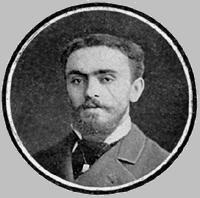Georges Hüe
Georges Adolphe Hüe (born May 6, 1858 in Versailles , † June 7, 1948 in Paris ) was a French composer .
Life
Georges Hue's father was a respected architect who wanted his son to be his successor. Following the recommendation of Charles Gounod , who had got to know a self-composed piano piece by the young George (he received his first piano lessons from his mother), he turned to music. After taking lessons from Émile Paladilhe, he studied at the Paris Conservatory . In 1879 he received the prestigious Rome Prize . In the following years several operas by Hüe were performed successfully. In 1922 he became a member of the Académie des Beaux-Arts as the successor to Camille Saint-Saëns .
plant
Hue's compositional focus was on songs and stage works. Stylistically, he was strongly influenced by Richard Wagner ( Bayreuth , where he was a regular guest at the Richard Wagner Festival , made him an honorary citizen). You are most likely to come across individual instrumental pieces (such as a Fantaisie and a Nocturne for flute and piano) and individual songs (e.g. the spring song À des Oiseaux ).
literature
- Blume, Friedrich (Ed.): Music in the past and present , 1st edition, 1949–1986
- Ursula Pešek, Željiko Pešek: Flute music from three centuries . Bärenreiter, Kassel 1990, ISBN 3-7618-0985-9 , p. 140
Web links
- Works by and about Georges Hüe in the catalog of the German National Library
| personal data | |
|---|---|
| SURNAME | Hi, Georges |
| ALTERNATIVE NAMES | Hüe, Georges Adolphe (full name) |
| BRIEF DESCRIPTION | French composer |
| DATE OF BIRTH | May 6, 1858 |
| PLACE OF BIRTH | Versailles , France |
| DATE OF DEATH | June 7, 1948 |
| Place of death | Paris , France |
